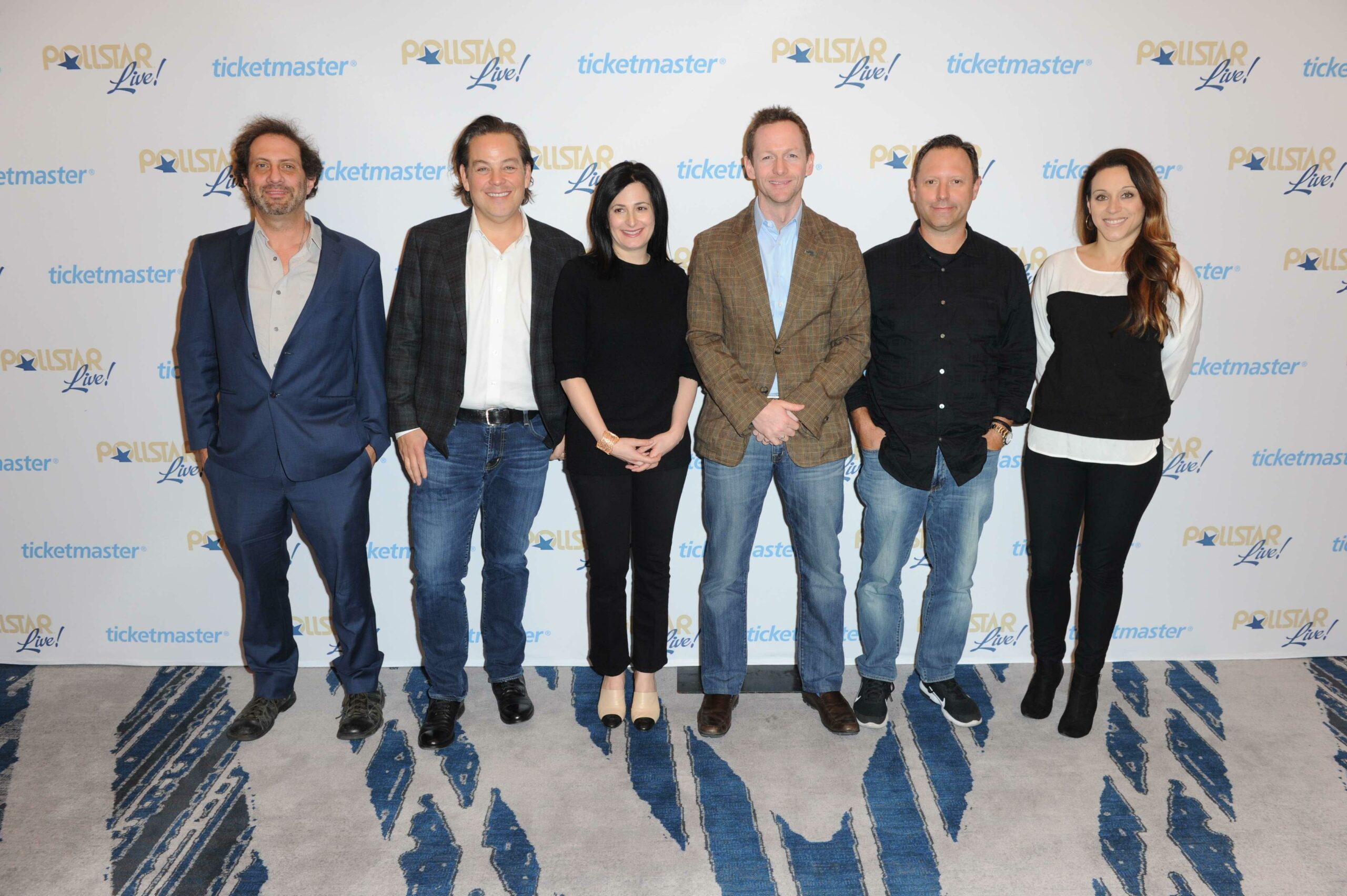Features
Pollstar Live! Coverage: ‘Off The Rails’ With Paul Bassman, Carrie Davis, Ken Fermaglich

Waterproof Pictures – Pollstar Live! 2018 Off The Rails Panelists
(From Right To Left) Andy Gensler (OVG), Paul Bassman (Ascend), Carrie Davis (Live Nation), Tim Epstein (Duggan Bertsch) Ken Fermaglich (UTA) and Kasey McKee (CAA).
Bad things happen in live music, to use a polite version of the familiar phrase. A canceled event. An event hastily moved due to a flooded concert site. A stadium in tatters after a shortened set led fans to riot. Things will eventually go wrong, so get an insurance policy, plan, follow best practices, and don’t dig yourself a financial hole.
As far as festivals going wrong, few music events in recent memory outdo the infamous Fyre Festival, an overambitious, Bahamian boondoggle that attracted multiple lawsuits—including a federal charge for wire fraud—after the canceled event fell short of promises and stranded most attendees at the airport on the remote island of Exuma. The conditions were captured on social media and spread across the Internet, causing a firestorm of anger and allegations and resulting in investigations by the Securities Exchange Commission, the FBI, and federal prosecutors.
Accidents of all stripes are bound to happen. Some accidents are considered force majeure, an uncontrollable event nobody could have anticipated or controlled, others can be mitigated, and many should have easily been avoided. When things go off the rails, concert promoters, venues, and performers shouldn’t suffer financially. The advice and anecdotes provided in the Pollstar panel, “When Things Go Off the Rails,” would have scared straight even the most cavalier person in the room.
Fyre’s problems stemmed from promoter ineptitude. Fyre’s organizers would need insurance that required standard documents such as a contract with the production company, the production company’s insurance certificates, and the security company’s event plan and insurance certificate. Panelist Paul Bassman, whose company Ascend provides entertainment insurance and risk management services, did some early work on the festival. After “hundreds” of text, phone calls and emails, he couldn’t get the Fyre team to meet a few objectives to secure an insurance policy—not even an “exorbitant” policy that reflected the event’s risk.
Guns N’ Roses provides an example of planning to prevent crises. Guns N’ Roses’ earned a reputation as a dangerous band in the early ‘90s, most notably for a riot at the Montreal stop of the 1992 Guns N’ Roses/Metallica stadium tour. A pyrotechnics accident left Metallica singer James Hetfield with second- and third-degree burns and cut short the band’s set; fans turned violent after Gun N’ Roses also cut short its set. Montreal wasn’t an isolated incident. A year earlier, fans in St. Louis rioted after Rose saw a man with a camera in the crowd—this was pre-smartphone—dove off the stage to confront him, and, once back on stage, blamed the “lame-ass security” for the mishap and walked off.
So with history as a guide, management laid out clear expectations t Guns N’ Roses’ and explained how deviating from the plan—such as exceeding a curfew—would have financial consequences. “There was a real change in attitude” from tours of the past, said Ken Fermaglich, senior vice president, and agent at UTA. (As a side note, during Guns N’ Roses’ hiatus, bass player Duff McKagan attended Seattle University’s business school and co-founded a wealth management firm for musicians.) Touring with AC/DC also helped management steer Guns N’ Roses. AC/DC guitarist Angus Young made clear to Rose his expectations for punctuality. AC/DC goes on stage on time, so the band needed Guns N’ Roses to go on stage on time. “As soon as Axl hears that from his peer, I think something changed. He got it and understood that was an important part of the performance, and he wanted to make Angus happy in that regard, and there was never any issue.”

Waterproof Pictures – Pollstar Live! 2018 Off The Rails Panelists
(From Right To Left) Andy Gensler (OVG), Paul Bassman (Ascend), Carrie Davis (Live Nation), Tim Epstein (Duggan Bertsch) Ken Fermaglich (UTA) and Kasey McKee (CAA).
Accidents can turn deadly. Back in 2011, a windstorm toppled a stage scaffolding at the Indiana state fair before a performance by country act Sugarland, killing seven people and resulting in numerous lawsuits against the band, promoter Live Nation, and over a dozen other parties. The state of Indiana, Live Nation, and 18 other defendants paid settlements equalling $50 million.
Things can go off the rails without physical injury. Kasey McKee, a music agent at CAA, told the story of how a faculty strike two weeks before a university concert led the promoter to reach an agreement with the artist management to cancel the show. Not long after the strike ended and the university wanted to revive the concert. That can’t happen, McKee told the university. We had an agreement. That’s not how it works.”
In an event like a concert canceled due to faculty strike, the insurance policy should pay the amount of a lost guarantee, minus anything that collected from the school. Even so, the manager and promoter can take steps to mitigate the problem. “Can we move it to another venue away from the faculty? The insurance policy might cover the cost of moving to another versus paying the full guarantee—if it’s less expensive than the cost of canceling,” McKee said.
Physical injury is a constant worry, from fans being crushed or trampled to drones crashing. Drones, a relatively new addition to music events, can be used to capture video at unique vantage points. But the drones of artists, venues or promoters can occasionally have mishaps, like in 2015 when Enrique Iglesias was clipped by a drone used in his stage show and required reconstructive hand surgery, or when Muse’s blimp-shaped drone fell onto a crowd in 2016. Because of the inherent liability in allowing drones at concerts and festivals, many promoters and artists build no-drone restrictions into insurance policies.
Accidents aren’t called random for no good reason. A team can have a plan, follow good processes and best practices—have a general counsel present, don’t invite third parties into a discussion, take photos to be used as evidence in future lawsuits—but something bad can still happen. Ultimately, Live Nation chief communications officer Carrie Davis explained, crisis management “is art, not science.”